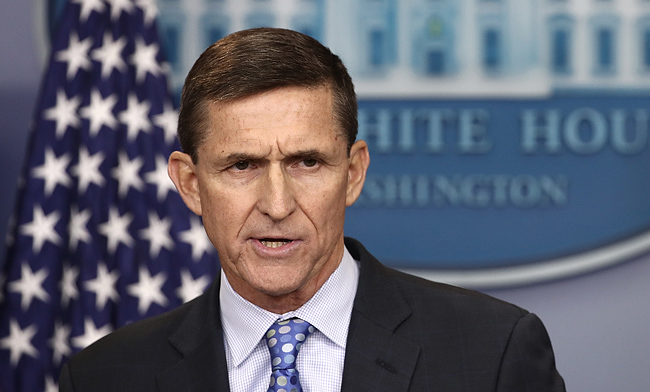
Gen. Michael Flynn has resigned his position with the Trump administration according to CNN. The decision follows a series of reports connecting the Trump national security advisor with Russia’s ambassador to the U.S. This would include the latest report by The Washington Post (late on Monday) that indicated the Justice Department, including acting Attorney General Sally Q. Yates, warned the White House that Flynn was ” potentially vulnerable to Russian blackmail” and “misled senior administration officials” about his phone calls with Russia’s ambassador. The warning came in the days before President Trump’s inauguration and was the result of a month-long push to inform the incoming administration of findings by the law enforcement and intelligence communities.
Breaking: text of Flynn's resignation letter pic.twitter.com/KGue1cJFzL
— Zeke Miller (@ZekeJMiller) February 14, 2017
The investigation by the FBI and other agencies had been reported back in mid-January and seemed to indicate that Flynn’s actions possibly violated the Logan Act — something they knew had “little chance” of sticking to Flynn according to the Post — and that the national security adviser had put himself in a “compromising position” that led to Vice President Mike Pence being “misled.”
Breaking News: Michael Flynn is said to have resigned as President Trump's national security adviser https://t.co/IEaAljq8Kz
— The New York Times (@nytimes) February 14, 2017
According to the New York Times, the White House is examining the situation and still believes that the details of the call are still vague enough to keep Flynn’s future with the administration at even odds:
The White House has examined a transcript of a wiretapped conversation that Mr. Flynn had with Sergey I. Kislyak, the Russian ambassador, in December, according to administration officials. Mr. Flynn originally told Mr. Pence and others that the call was limited to small talk and holiday pleasantries.
But the conversation, according to officials who have seen the transcript of the wiretap, also included a discussion about sanctions imposed on Russia after intelligence agencies determined that President Putin’s regime tried to interfere with the 2016 election on Mr. Trump’s behalf.
Still, current and former administration officials familiar with the call said the transcript was ambiguous enough that Mr. Trump could justify both firing or retaining Mr. Flynn.
The decision to inform the Trump administration of Flynn’s actions and the details of his phone call came after nearly a month of debate. According to The Washington Post, intelligence officials were aware of the calls and noted that they peaked following President Obama’s sanctions against Russian diplomats on December 29th. The Kremlin’s lack of response, praised by Obama at the time, was seen as a questionable move and prompted extra scrutiny into the Flynn phone conversations.
The discussions to release the information to the incoming team continued up until Obama’s last full day in office, with one notable member opposing notification according to The Washington Post:
The internal debate over how to handle the intelligence on Flynn and Kislyak came to a head on Jan. 19, Obama’s last full day in office.
Yates, Clapper and Brennan argued for briefing the incoming administration so the new president could decide how to deal with the matter. The officials discussed options, including telling Pence, the incoming White House counsel, the incoming chief of staff or Trump himself.
FBI Director James B. Comey initially opposed notification, citing concerns that it could complicate the agency’s investigation.
Clapper and Brennan left their positions when Trump was sworn in, but Yates stayed on as acting attorney general until Jan. 30, when Trump fired her for refusing to defend his executive order temporarily barring refugees and people from seven majority-Muslim countries — an action that had been challenged in court.
White House counselor Kellyanne Conway told reporters on Monday afternoon that the president has “full confidence” in Flynn, only to be contradicted by the Spicer comments mentioned above and Flynn’s eventual resignation.
Flynn’s resignation adds more calamity to the opening weeks of the Trump administration and raises more questions about it’s connections to Russia and Vladimir Putin.
Brian Taff of Philadelphia’s local ABC affiliate points out on Twitter that “Flynn now leaves two administrations, from both political parties, in disgrace.”
